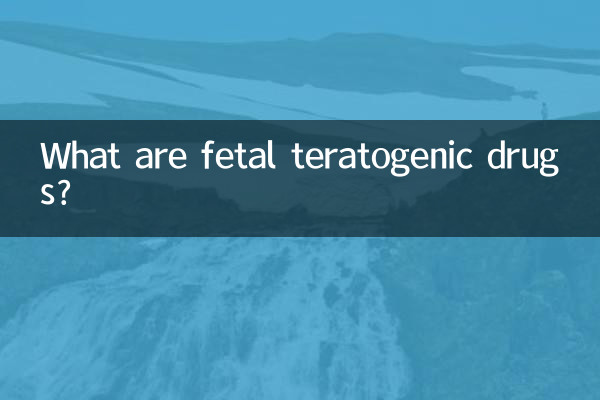What are fetal teratogenic drugs?
During pregnancy, medication needs to be used with extreme caution. Some drugs may affect fetal development through the placenta, causing malformations or other adverse consequences. This article will combine recent hot topics and medical data to sort out the categories and specific names of drugs with a higher risk of fetal teratogenesis to help expectant mothers avoid risks.
1. Classification of fetal teratogenic drugs

According to the U.S. FDA pregnancy drug classification and clinical studies, the following drugs may cause teratogenic effects on the fetus:
| drug class | Representative medicine | Teratogenic risk level | Main hazards |
|---|---|---|---|
| antibiotic | Tetracycline, streptomycin | Class D (high risk) | Abnormal skeletal development, hearing impairment |
| antiepileptic drugs | Sodium valproate, phenytoin | Class D | Neural tube defects, facial deformities |
| Vitamin A acids | Isotretinoin (acne medicine) | Rated X (disabled) | Heart malformations, craniofacial defects |
| anticoagulants | warfarin | Class D | Nasal cavity dysplasia, central nervous system abnormalities |
| Hormones | Diethylstilbestrol | X-rated | Genital malformations, vaginal cancer (in adulthood) |
2. Recent hot topics and controversial drugs
1.COVID-19 treatment drugs: Recent studies have shown that some antiviral drugs (such as ribavirin) may increase the risk of fetal malformations, and pregnant women should avoid using them.
2.Safety of Chinese Herbal Medicine: Some traditional Chinese medicines (such as realgar and cinnabar) contain heavy metal components, and long-term use may cause damage to the fetal nervous system.
3. How to avoid the risk of drug teratogenesis?
1.Pre-pregnancy consultation: Three months before planning to become pregnant, review the safety of the medications you are taking with your doctor.
2.Strictly follow medical advice: When medication must be taken during pregnancy, choose drugs classified as A/B by the FDA (such as penicillin).
3.Be wary of over-the-counter medications: Common antipyretics (such as ibuprofen) may cause fetal ductus arteriosus premature closure in the third trimester.
4. Teratogenic sensitive period and preventive measures
| Gestational age | developmental stage | High-risk drug effects |
|---|---|---|
| 0-2 weeks | fertilized egg implantation | “All or nothing” effect (either miscarriage or no effect) |
| 3-8 weeks | organogenesis | Heart, limbs, and facial deformities are at highest risk |
| 9 weeks later | functional perfection period | The nervous system and reproductive system may still be damaged |
Summarize:Fetal teratogenic drugs require great attention, especially in the first trimester. It is recommended that pregnant women obtain medication guidance through regular hospital channels and avoid blindly using folk prescriptions or self-purchased drugs.
(Note: The above data are based on recent medical literature and FDA announcements. Please follow your doctor’s advice for specific medication.)

check the details

check the details